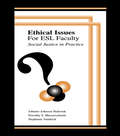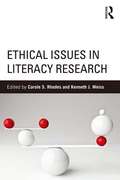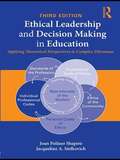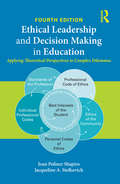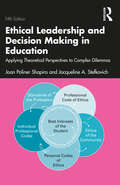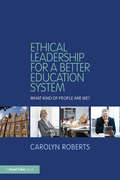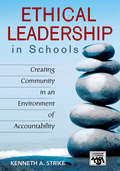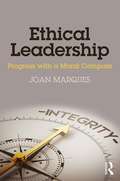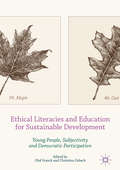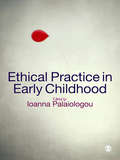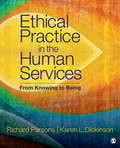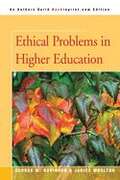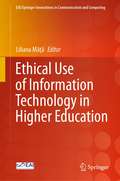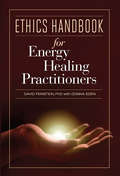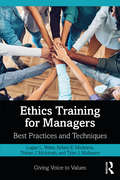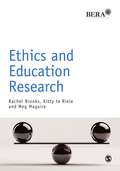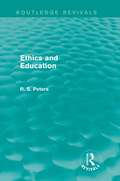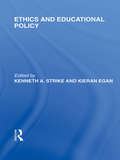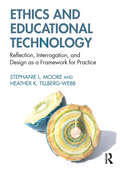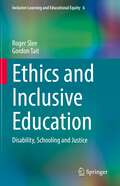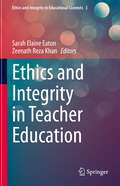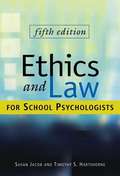- Table View
- List View
Ethical Issues for Esl Faculty: Social Justice in Practice
by Johnnie Johnson Hafernik Stephanie Vandrick Dorothy S. MesserschmittThis book explicitly addresses ethical dilemmas and issues that post-secondary ESL faculty commonly encounter and examines them in the framework of social justice concerns. Ethics is defined broadly, to include responsibilities and obligations to students inside and outside the classroom, as well to colleagues, educational institutions, the TESL profession, and society as a whole. Scenarios in each chapter provide realistic and compelling situations for reflection and discussion. The authors then set out the issues raised, relate them to the classroom environment, and offer opportunities to examine them in a variety of contexts and to consider possible solutions to the dilemmas. Issues include testing, plagiarism, technology, social and political issues affecting students and the classroom, gift-giving, curriculum decisions, disruptive students, institutional constraints, academic freedom, gender, class, and power. Busy classroom instructors will find this book accessible, thought-provoking, and relevant to their daily work situations. It is not intended as a theoretical treatment of ethics and social justice in ESL, nor does it propose that ESL faculty teach morals or ethics to students. Rather, it is designed as a concise, practical introduction to ethical practice for both new and experienced ESL faculty in post-secondary teaching situations in the United States, for others interested in the ESL classroom, and as a text for TESL classes and seminars. Ethical Issues for ESL Faculty: *maps new territory in the field--ethical issues in TESL, particularly as encountered by post-secondary classroom teachers, are not often discussed in ESL publications; *makes the complex issues of ethics in the context of social justice accessible to TESL practitioners; and *includes useful resources, such as additional scenarios for discussion, an extensive reference list, and selected ethics-related Web sites.
Ethical Issues in Literacy Research
by Carole S. Rhodes Kenneth J. WeissLiteracy educators and researchers at all stages of their careers face ethical issues whenever they embark on research studies. In this book experienced literacy researchers identify and address multi-faceted, multi-dimensional ethical issues related to conducting studies in school, home, community, and virtual settings and share actions taken when faced with ethical dilemmas in their own investigations. Each chapter addresses a specific literacy research ethical issue. Part I focuses on conducting research in settings such as schools or literacy clinics. Part Two addresses research with pre-service teachers in college/university and school settings. Part Three looks at research in virtual worlds and online environments. Pedagogical features in each chapter engage readers in making connections between what they are reading and their own teaching and learning situations: A vignette to help readers understand the issue; pre-reading questions ; background information drawn from current research literature; suggested engagement activities; chapter summary. Additional resources (PowerPoint Presentations; Case Studies; Website Links; Interactive "Ask the Researcher Websites/Blogs/Tweets") are available on a website linked to the book: www.LiteracyResearchEthics.com
Ethical Leadership and Decision Making in Education
by Joan Poliner Shapiro Jacqueline A. StefkovichThe third edition of the best-selling text, Ethical Leadership and Decision Making in Education, continues to address the increasing interest in ethics and assists educational leaders with the complex dilemmas in today's challenging and diverse society. Through discussion and analysis of real-life moral dilemmas that educational leaders face in their schools and communities, authors Shapiro and Stefkovich demonstrate the application of their four ethical paradigms--the ethics of justice, care, critique, and profession. After an illustration of how the Multiple Ethical Paradigm approach may be applied to real dilemmas, the authors present a series of cases written by students and academics in the field representing the dilemmas faced by practicing educational leaders in urban, suburban, and rural settings in an era full of complexities and contradictions. Following each case are questions that call for thoughtful, complex thinking and help readers come to grips with their own ethical codes and apply them to practical situations. New in the Third Edition: An entire new chapter on privacy versus safety, including ethical issues such as strip searches, gang membership, cyber-bullying, and sexting. New cases infused into chapters on early childhood education, diverse student populations, and technology. Updates throughout to reflect contemporary issues and recent scholarship in the field of ethical leadership. Including teaching notes for the instructor stressing the importance of self-reflection, this text is easily adaptable for a variety of uses with a wide range of audiences. Ethical Leadership and Decision Making in Education is a valuable book for both aspiring and practicing administrators, teacher leaders, and educational policy makers.
Ethical Leadership and Decision Making in Education: Applying Theoretical Perspectives to Complex Dilemmas
by Joan Poliner Shapiro Jacqueline A. StefkovichThe fourth edition of the best-selling text, Ethical Leadership and Decision Making in Education, continues to address the increasing interest in ethics and assists educational leaders with the complex dilemmas in today’s challenging and diverse society. Through discussion and analysis of real-life moral dilemmas that educational leaders face in their schools and communities, authors Shapiro and Stefkovich demonstrate the application of the four ethical paradigms—the ethics of justice, care, critique, and profession. After an illustration of how the Multiple Ethical Paradigm approach may be applied to real dilemmas, the authors present a series of cases written by students and academics in the field representing the dilemmas faced by practicing educational leaders in urban, suburban, and rural settings in an era full of complications and contradictions. Following each case are questions that call for thoughtful, complex thinking and help readers come to grips with their own ethical codes and apply them to practical situations. New in the Fourth Edition: A new chapter on technology versus respect, focusing on ethical issues such as cyber-bullying and sexting. New cases on teachers with guns, the military and education, children of undocumented immigrants, homeless students, videos in bathrooms, incentive pay, first responders, private alternative high schools, verbal threats, and gaming etiquette. Updates throughout to reflect contemporary issues and recent scholarship in the field of ethical leadership. This edition adds teaching notes for the instructor that stress the importance of self-reflection, use of new technologies, and global appeal of ethical paradigms and dilemmas. Easily adaptable to a variety of uses, this book is a critical resource for a wide range of audiences, including both aspiring and practicing administrators, teacher leaders, and educational policy makers.
Ethical Leadership and Decision Making in Education: Applying Theoretical Perspectives to Complex Dilemmas
by Jacqueline A. Stefkovich Joan Poliner ShapiroThe fifth edition of the best-selling text, Ethical Leadership and Decision Making in Education, continues to address the increasing interest in ethics and assists educational leaders with complex dilemmas in today’s challenging, divided, and diverse societies. Through discussion and analysis, Shapiro and Stefkovich demonstrate the application of four ethical paradigms – the ethics of justice, critique, care, and the profession. After illustrating how the Multiple Ethical Paradigms may be applied to authentic dilemmas, the authors present cases written by graduate students, practitioners, and academics representing dilemmas faced by educational leaders in urban, suburban, and rural public and private schools and universities, in the U.S. and abroad. Following each case are questions that call for thoughtful, complex thinking and help readers apply the Multiple Ethical Paradigms to practical situations. New in the Fifth Edition are more than ten new cases that cover issues of food insufficiency, the pandemic’s effects on diverse school populations, a student’s sexual orientation, transgender students in the university, lock-down drills for young children, refugees in a Swedish school, boundaries in high school sports, generational differences in an adult diploma school, acceptance of animals on campus, and hate speech in the academy. This edition also includes teaching notes for the instructor stressing the importance of self-reflection, use of new technologies, and global appeal of ethical paradigms and dilemmas. This book is a critical resource for aspiring and practicing administrators, teacher leaders, and educational policy makers.
Ethical Leadership for a Better Education System: What Kind of People Are We?
by Carolyn RobertsWhat kind of people run our schools? What makes them behave as they do? What kind of an example do they set? How can headteachers live up to expectations? What makes them fail? What keeps the profession in good standing in the taxpayer’s eye, and what undermines it? Ethical Leadership for a Better Education System: What Kind of People Are We? sets out a new vision for school leadership, moving beyond ‘leadership styles’ and ‘best practice’, to the motivations of school leaders. It proposes a way for the profession to embrace, develop and maintain ethical standards. Chapters: Explore the 2017–18 Ethical Leadership Commission, considering the core values and virtues, principles and behaviour we should expect from our school leaders Provide a clear, ethical code for thinking about reinforcing ethical standards among school leaders Look at the tensions between professionalism, accountability and in loco parentis Discuss structural change in the education system over 20 years Open discussion and reflections on the dilemmas facing ethical leaders and how to tackle them Demonstrate a way through the accountability pressures headteachers face, drawing on personal experience Place practical issues within the context of the whole system Considering the future vision of educational leadership, Ethical Leadership for a Better Education System will appeal to all levels of school leaders, existing and aspiring. It should help everyone who leads in school, and everyone who cares about the models we set before the nation’s young.
Ethical Leadership in Schools: Creating Community in an Environment of Accountability
by Kenneth A. StrikeThis invaluable resource explores situations that principals are likely to encounter and presents questions and issues to help them confront difficult ethical dilemmas.
Ethical Leadership: Progress with a Moral Compass
by Joan MarquesThis book introduces readers to the moral dilemmas associated with business decisions, helping students to understand the moral and ethical considerations leaders face in the workplace, and providing a framework for balancing business demands with doing the right thing. The author walks readers through the basics of Western moral philosophy before the 20th century and beyond it, covering Utilitarianism, Universalism, the Golden Rule, and Virtue Ethics as well as compelling Eastern moral philosophy to help readers link individual behavior to the larger scheme of corporate social responsibility. The text combines this with a survey of various leadership theories—such as servant leadership, awakened leadership, authentic leadership, and spiritual leadership—to present a model that combines the strengths of each theory. Students will become familiar with the mindsets behind moral pitfalls along with their potentially disastrous effects and how these can be overcome. Chapter summaries and relevant cases, including studies on Fidel Castro, Wells Fargo, Mylan’s EpiPen Price Gouging, and more will help students to place theories in context, learning how to achieve success in business ventures successfully, compassionately and ethically. With an easy-to-grasp three-part progression and reflective questions for both chapters and cases, Ethical Leadership will benefit students of leadership and business ethics.
Ethical Literacies and Education for Sustainable Development
by Olof Franck Christina OsbeckThis book explores the ethical dimensions surrounding the development of education for sustainable development within schools, and examines these issues through the lens of ethical literacy. The book argues that teaching children to engage with nature is crucial if they are to develop a true understanding of sustainability and climate issues, and claims that sustainability education is much more successful when pupils are treated as moral agents rather than being passive subjects of testing and assessment. The collection brings together a range of fresh and creative perspectives on how issues around ethical literacies can be elaborated and expanded with regard to democratic sustainability education. The use of children#65533;s books in teaching about sustainability is carefully explored, as are the ethical and aesthetic dimensions of environmental education. The book will be of great interest to students and researchers in the field of sustainability education.
Ethical Practice in Early Childhood
by Ioanna PalaiologouEthical considerations are raising new questions about the involvement and participation of children in research. By considering the ethical issues that can arise when working with and doing research with young children from birth to five years, this book examines a wide range of topics including: - involving young children in research - informed consent - research tools with children under five - researching children with special needs - researching vulnerable groups - researching other cultures - multi-agency working - loss and bereavement - ethical practices when studying early childhood - safe-guarding young children - inspection - ethics and leadership Examples from education, health and social work are examined, and there are chapter overviews, activities, case studies, points for discussion and recommendations for further reading and useful Websites in each chapter; which help to engage the reader and facilitate critical thinking and reflective practice. This is a comprehensive guide to a developing field for the early years student and practitioner.
Ethical Practice in the Human Services: From Knowing to Being
by Dr Richard D. Parsons Dr Karen L. DickinsonEthical Practice in the Human Services by Richard D. Parsons and Karen L. Dickinson moves beyond addressing ethical issues and principles to helping readers actually practice ethical behavior through awareness of their personal morals, values, and choices. With coverage of ethical standards from six different associations, the text addresses ethical issues and principles in social work, counseling, psychology, and marriage and family therapy. Robust pedagogy includes case illustrations and guided exercises to give readers a deeper understanding of the underlying moral principles and values that serve as a foundation for the various ethical codes.
Ethical Practice in the Human Services: From Knowing to Being
by Dr Richard D. Parsons Dr Karen L. DickinsonEthical Practice in the Human Services by Richard D. Parsons and Karen L. Dickinson moves beyond addressing ethical issues and principles to helping readers actually practice ethical behavior through awareness of their personal morals, values, and choices. With coverage of ethical standards from six different associations, the text addresses ethical issues and principles in social work, counseling, psychology, and marriage and family therapy. Robust pedagogy includes case illustrations and guided exercises to give readers a deeper understanding of the underlying moral principles and values that serve as a foundation for the various ethical codes.
Ethical Problems in Higher Education
by Janice Moulton George M. RobinsonThe Ivory Tower Myth suggests that the world of higher education has no moral problems. Unlike ethical conflicts in business, politics and medicine, ethical problems in higher education receive little publicity. But devotion to the pursuit of knowledge does not ensure ethical behavior. Power, competition, pressure and lust for recognition create moral conflicts. Some are unique to higher education but many are common to the world off-campus. <p><p> This book uses ethical theories as a tool to analyze real examples from our colleges and universities. Topics include: academic freedom, plagiarism, cheating, research fraud, equal opportunity, evaluation, tenure, student-faculty relationships.
Ethical Use of Information Technology in Higher Education (EAI/Springer Innovations in Communication and Computing)
by Liliana MâțăThis book addresses current issues regarding the ethical use of information technology in a holistic vision, by combining the perspectives of education specialists and those in the field of computer science at the level of higher education. It provides a current ethical perspective on the problems and solutions involved in the use of information technology in higher education. It appeals to readers interested in exploring the problems and appropriate solutions related to the ethical use of new technologies in higher education.
Ethics And Human Values Intermediate First Year - Telangana Board
by Smt K Srilatha S Vinayak Dr Vanapalli Venkat Rao Prof S Abdul Sattar Smt R Sumathi Devi P Vijaya KumarThis is the prescribed text book for students pursuing Intermediate First year under Telangana Board for the sujbect Ethics and Human Values
Ethics Handbook for Energy Healing Practitioners
by David FeinsteinEthical principles are far more than mere rules or regulations - they are maps for bringing out your best as a caregiver and healer. Responding to a lack of articulated or standardized ethical guidelines for energy healing practitioners, David Feinstein, PhD, and Donna Eden developed a professional curriculum that has become one of the country's most successful and effective energy medicine certification programs. Now, this comprehensive, case-oriented guide allows veterans of the field and newcomers alike to work through a wide range of ethical dilemmas before they arise, helping you to prevent professional errors that could hurt you, your clients, and your practice.
Ethics Training for Managers: Best Practice and Techniques (Giving Voice to Values)
by Logan L. Watts Kelsey Medeiros Tristan McIntosh Tyler MulhearnCan employees be trained to make more ethical decisions? If so, how? Providing evidence-based and practical answers to these critical questions is the purpose of this book. To answer these questions, the authors—four organizational psychologists who specialize in the study of ethical decision making—translate insights based on decades of scientific research. Whether you are a student, educator, HR manager, compliance professional, or simply someone interested in the topic of ethics education, this book offers a road map for designing ethics training programs that work.
Ethics and Education Research (BERA/SAGE Research Methods in Education)
by Kitty Te Riele Professor Meg Maguire Professor Rachel BrooksPart of the popular BERA/SAGE Research Methods in Education series, this is the first book to specifically focus on the ethics of Education research. Drawn from the authors’ experiences in the UK, Australia and mainland Europe and with contributions from across the globe, this clear and accessible book includes a wide range of examples The authors show how to: identify ethical issues which may arise with any research project gain informed consent provide information in the right way to participants present and disseminate findings in line with ethical guidelines All researchers, irrespective of whether they are postgraduate students, practising teachers or seasoned academics, will find this book extremely valuable for its rigorous and critical discussion of theory and its strong practical focus. Rachel Brooks is Professor of Sociology and Head of the Sociology Department at the University of Surrey, UK. Kitty te Riele is Principal Research Fellow in the Victoria Institute for Education, Diversity and Lifelong Learning, at Victoria University in Australia. Meg Maguire is Professor of Sociology of Education at King’s College London.
Ethics and Education Research (BERA/SAGE Research Methods in Education)
by Meg Maguire Rachel Brooks Kitty Te RielePart of the popular BERA/SAGE Research Methods in Education series, this is the first book to specifically focus on the ethics of Education research. Drawn from the authors' experiences in the UK, Australia and mainland Europe and with contributions from across the globe, this clear and accessible book includes a wide range of examples The authors show how to: identify ethical issues which may arise with any research project gain informed consent provide information in the right way to participants present and disseminate findings in line with ethical guidelines All researchers, irrespective of whether they are postgraduate students, practising teachers or seasoned academics, will find this book extremely valuable for its rigorous and critical discussion of theory and its strong practical focus. Rachel Brooks is Professor of Sociology and Head of the Sociology Department at the University of Surrey, UK. Kitty te Riele is Principal Research Fellow in the Victoria Institute for Education, Diversity and Lifelong Learning, at Victoria University in Australia. Meg Maguire is Professor of Sociology of Education at King's College London.
Ethics and Education: The Lindsay Memorial Lectures Delivered At The University Of Keele, February-march 1971 And The Swarthmore Lecture Delivered To The Society Of Friends 1972 By Richard S. Peters (Routledge Revivals: R. S. Peters on Education and Ethics)
by R. S. PetersFirst published in 1966, this book was written to serve as an introductory textbook in the philosophy of education, focusing on ethics and social philosophy. It presents a distinctive point of view both about education and ethical theory and arrived at a time when education was a matter of great public concern. It looks at questions such as ‘What do we actually mean by education?’ and provides a proper ethical foundation for education in a democratic society. The book will appeal to both teachers and students of philosophy as well as education.
Ethics and Educational Policy (International Library of the Philosophy of Education Volume 21)
by Kenneth A. StrikeThis is a philosophical treatment of the conceptual and normative aspects of topics which are currently a matter of policy debate in education. The authors have focussed on such concepts as liberty, autonomy, equality and pluralism, and have provided a philosophical commentary which relates these concepts both to a background of philosophical literature, and to the institutional contexts and policy debates in which they function. The book will be of significance to all policy makers who need to gain an understanding of the values and concepts involved in major policy problems.
Ethics and Educational Technology: Reflection, Interrogation, and Design as a Framework for Practice
by Stephanie L. Moore Heather K. Tillberg-WebbEthics and Educational Technology explores the creation and implementation of learning technologies through an applied ethical lens. The success of digital tools and platforms in today’s multi-faceted learning and performance contexts is dependent not only on effective design and pedagogical principles but, further, on an awareness of these technologies’ interactions with and implications for users and social systems. This first-of-its-kind book provides an evidence-based, process-oriented model for ethics in technology-driven instructional design and development, one that necessitates intentional reflective practice, a critical and theoretically informed interrogation of technology, and a participatory approach to technology design and applications. Rich with real-world ethics examples and design cases, supported by reflection questions and applied activities, and attentive to ethical codes among preeminent educational technology organizations, this is an ideal resource for students, faculty, researchers, and professionals across educational technology, instructional design, learning sciences, learning engineering, organizational training, and other disciplines.
Ethics and Inclusive Education: Disability, Schooling and Justice (Inclusive Learning and Educational Equity #6)
by Gordon Tait Roger SleeThis book reveals the entanglement of ethics, rights and justice in education. It aims to develop everyday philosophy to guide choices as we continue to attempt to make schools places for all comers. The authors offer education as a social good, a building block for inclusive communities. This assumes an ethical predisposition. Ethics and inclusive education takes the reader on a journey through the conceptual foundations of ethics, rights and justice to assist us to build a formulation of the fair or just society and the way ethical approaches to schooling may support or unravel that.
Ethics and Integrity in Teacher Education (Ethics and Integrity in Educational Contexts #3)
by Sarah Elaine Eaton Zeenath Reza KhanThis book addresses issues related to ethics and integrity in teacher training. Authors pay special attention to the role ethics plays in teaching practice and the importance of establishing expectations for students to learn with integrity from a young age. The book celebrates global perspectives on ethics and integrity for pre-service teachers, acknowledging that although some aspects of ethics are universal, the ways in which these are implemented can vary. Contributors present original research, case studies, and recommendations for practice and teaching. The book draws on a range of theoretical and conceptual foundations including applied ethics, academic integrity, and moral education.
Ethics and Law for School Psychologists
by Timothy S. Hartshorne Dawn M. Decker Susan JacobThe definitive text-completely revised-on the professional and legal standards of school psychology Fully revised and now in its sixth edition, the single best source of authoritative information on the ethical and legal issues associated with school psychological practice includes the most up-to-date standards and requirements of the profession. Citing recent legal rulings and publications as well as historical references, Ethics and Law for School Psychologists provides the most comprehensive foundation for scholarship in this area.A key reference for understanding and delivering ethically and legally sound services, the text combines the expertise of three leading professionals at the forefront of the field. Completely updated to reflect the National Association of School Psychologists' (NASP) revised 2010 Principles for Professional Ethics, the new edition of this classic text also addresses the final regulations in implementing the Individuals with Disabilities Education Act (IDEA) and the amended Americans with Disabilities Act (ADA). In addition, the Sixth Edition features:New material on the management of sensitive, private student information and a revised section on privileged communicationBroader coverage of ethical-legal issues in school-based intervention, including a new section on interventions in the general education classroomThe latest research and professional literature related to ethics and law in school psychologyCovering the ethical and legal issues that impact every school psychologist, and with numerous pedagogical features including case vignettes, end-of-chapter questions, and topics for discussion, Ethics and Law for School Psychologists, Sixth Edition is well suited for graduate students in school psychology and is a must-have resource for all practicing school psychologists, educators, and school administrators.
